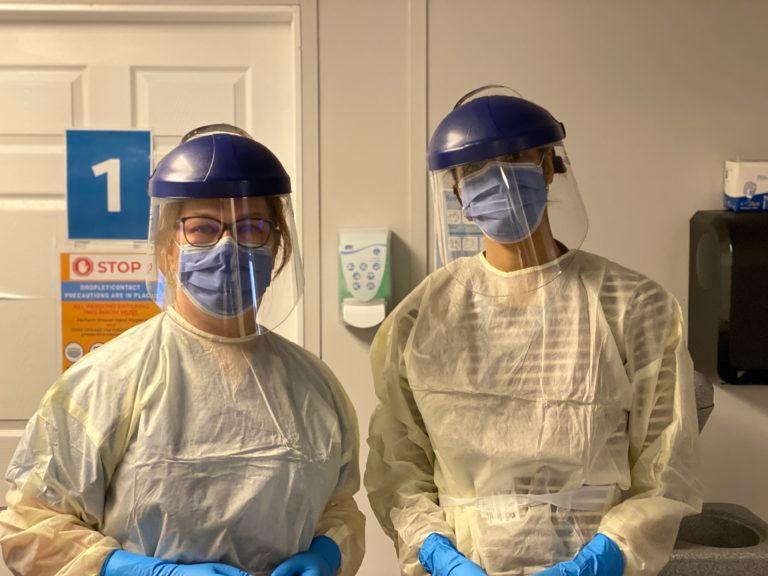Dispatches from the coronavirus front lines: ‘I am afraid of what lies ahead for humanity’
Jane Philpott describes her first few shifts working on the COVID-19 front lines at Markham Stouffville Hospital

Jane Philpott and fellow doctor Melanie Henry at the Markham Stouffville Hospital COVID-19 Assessment Centre. (Jane Philpott)
Share
Jane Philpott is a medical doctor and former Member of Parliament. Beginning July 2020 she will be dean of the Faculty of Health Sciences at Queen’s University. From 2015 to 2019, she served as federal Minister of Health, Minister of Indigenous Services and President of the Treasury Board. She currently works in the Markham Stouffville Hospital COVID-19 Assessment Centre.
Last Friday was my second shift at the Markham Stouffville Hospital COVID-19 Assessment Centre. The atmosphere was calm and orderly. But the patients who made it through triage to see a doctor were sicker than the ones on my first shift. Early in the shift, I sat across from one woman with symptoms highly suggestive of COVID-19. A week earlier she was completely healthy. Now she could barely walk across the parking lot due to shortness of breath. She described profound fatigue, how she was scarcely able to get out of bed. Her travel history made the diagnosis more evident. Listening to her lungs revealed telltale fine crackles on both sides.
There are certain patient interactions you know you’ll never forget. This was one of them. In that moment the pandemic felt more tangible than it was after weeks of reading media and medical reports. I was sitting across from a neighbour. I had a strong suspicion she was about to become another statistic, one of countless Canadians infected with the new coronavirus.
I was not afraid for myself. Like everyone else in the clinic, I am religiously following strict guidelines for using personal protective equipment (PPE). It’s not comfortable and it’s hard to communicate through both mask and headgear, but they are essential. Regrettably, health workers in parts of the country face shortages of PPE and it’s crucial that this is addressed.
MORE: ‘We went through something unique and scary together’: Leaving coronavirus quarantine
I am afraid of what lies ahead for humanity. I’ve been a doctor since 1984. I was a medical student when AIDS first appeared. I worked in Niger, West Africa with Médecins Sans Frontières when thousands of children were dying of hunger. I was a family doctor in Stouffville, Ontario when SARS struck. But I’ve never seen a level of alarm among health professionals comparable to what the current crisis has precipitated.
The emergence of COVID-19 signifies the most dangerous pandemic of our lifetime. We need all hands on deck. So, like hundreds—probably thousands—of others, I’ve returned to active clinical practice because of the pandemic.
It’s remarkable, the collegial atmosphere that emerges among a team of health professionals when you’re thrown together in a public health emergency. Our local COVID-19 assessment centre has triaged hundreds of patients. Patients and staff are extraordinarily serene. Most of the people we see and screen at this point won’t turn out to have coronavirus. But there’s an ominous feeling of impending doom. What kind of minefield are we walking into? What more can we do to protect one another and protect our community?
MORE: It’s time to think of homelessness as a public health emergency
Because of my political experience, people keep asking how I think the various orders of government are doing. At first, I didn’t want to comment at all. The very last thing you need in a public health crisis is partisan politics. I refuse to doubt the best intentions and good will of anyone who finds themself in a position of leadership in these extraordinary times.
My desire is not to be political, but to use my voice to be helpful as a courier from the front lines. For example, many colleagues are worried about the rationing of tests and the throttling back of guidelines on whom to test. Public health officials, dealing with restricted supplies and resources, are trying their best to prioritize. Swabs that had a turnaround time of 48 hours last week are now taking up to a week.
Many experts are advocating to aggressively increase testing capacity. Doctor and infectious disease specialist Andrea Crisanti, who has been working in Italy advises us to “test the neighbourhood, test the relatives, test the friends, and isolate all positive individuals.” Deadly virus outbreaks are controlled when people know their status. Knowledge impacts behaviour.
We have seen massive testing lead to containment of the virus in South Korea and Singapore. It’s linked to lower death rates in Germany. We could do the same. We can train and mobilize an army of public health outreach workers to deliver information and tests. We can vastly expand lab capacity using academic hospitals, universities and private labs, recruiting graduate students for technical work from across the basic sciences and health professions. We will need coordinated procurement of reagents and equipment. There is already a great search for high-quality, rapid COVID-19 tests. The U.S.A. Food and Drug Administration has authorized the use of a test that provides results in 45 minutes. South Korea is now producing a 10-minute version. Health Canada can expedite the process if a new test warrants approval. We can recruit medical and nursing students to assist in contact tracing, isolation instructions, and follow up of all positive cases.
The very foundation of public health is the notion that an ounce of prevention is worth a pound of cure. If we could expand capacity for testing, it would add to critical measures like physical distancing. Health workers on the ground desperately want public officials to take every possible step to lessen the burden of disease so critical care and emergency health teams will not be overwhelmed and the volume of suffering and grief will not consume society.